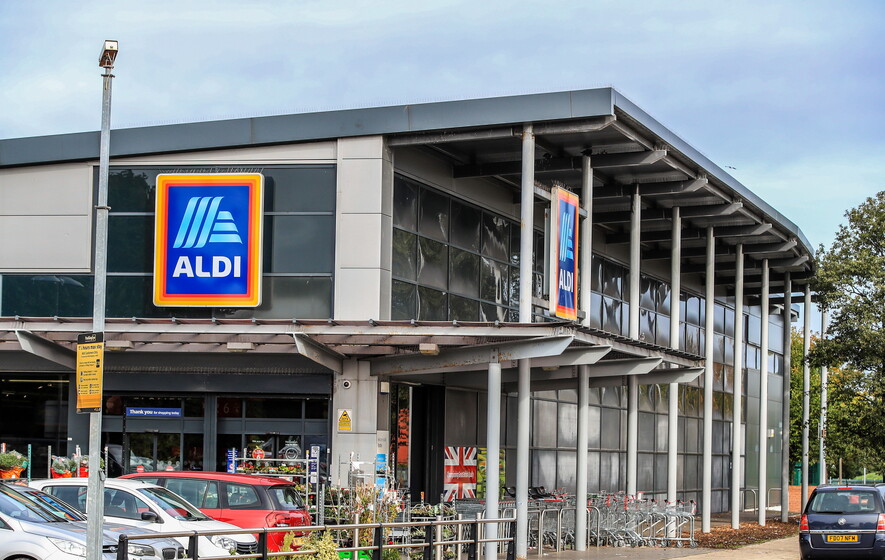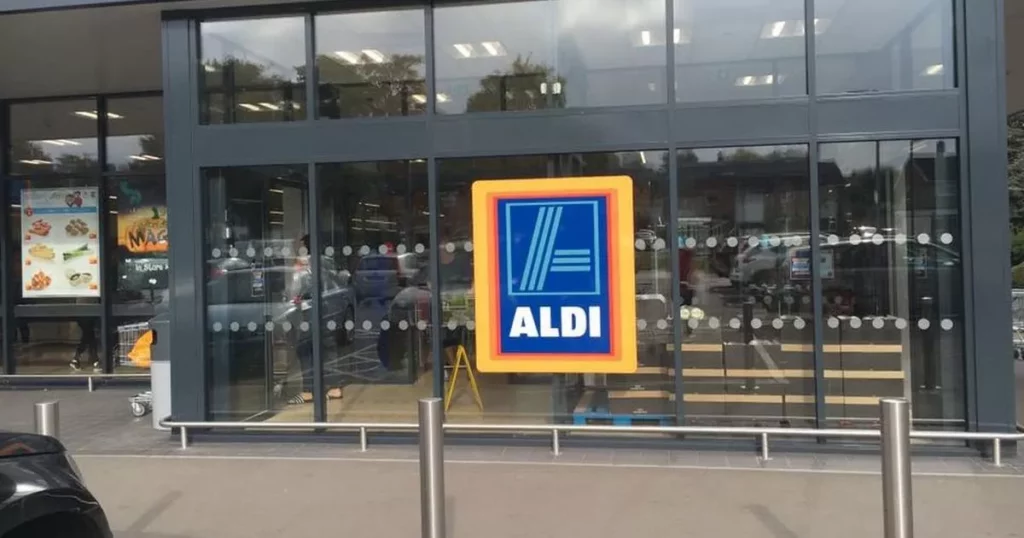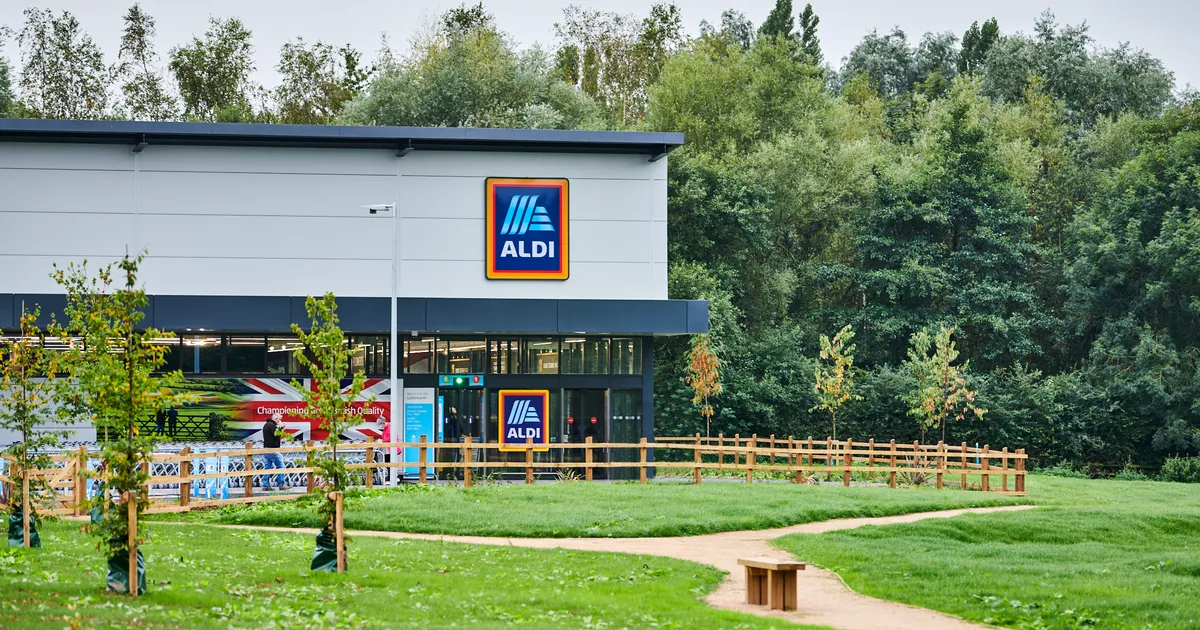Aldi’s absence in Northern Ireland is due to challenges with property availability, planning regulations, and market conditions, hindering its expansion efforts into the region’s retail landscape.
Northern Ireland, a beautiful region known for its stunning landscapes and vibrant culture, has long been a hub for retail giants. From Tesco to Lidl, the shelves are stocked with various consumer options.
However, one key player seems to be missing from this lineup – Aldi. Despite its widespread presence in other parts of the United Kingdom, the absence of Aldi in Northern Ireland has sparked curiosity and speculation among locals and visitors alike.
Why has this popular discount supermarket not spread across the Irish Sea? Some theories suggest political barriers, while others point to logistical challenges.
Let’s delve into this intriguing mystery and uncover the truth behind the absence of Aldi in Northern Ireland.
Why Is There No Aldi In Northern Ireland with The Factors Influencing Its Absences?

Aldi’s absence in Northern Ireland can be attributed to factors such as property availability, planning regulations, market dynamics, competition, and cultural adaptation.
Despite the global fame and value as a reputable discount supermarket chain, entering new markets requires navigating unique challenges.
Aldi’s expansion success has been demonstrated in numerous regions, but each market presents distinct obstacles.
While Aldi’s absence in Northern Ireland is notable, it reflects the careful strategic considerations required to maintain its reputation and value while adapting to local conditions.
However, the brand’s renowned approach to affordability and quality remains integral, regardless of the specific challenges faced in different regions.
Here are the key factors influencing Aldi’s absence in Northern Ireland, along with explanations:
Unavailability of suitable Property
Aldi typically seeks spacious and accessible properties for store establishments. These properties should accommodate their store layout, parking, and storage requirements while also located in high-traffic areas to attract customers efficiently.
Unfortunately, the properties that align with Aldi’s store layout and accessibility requirements might be limited, making it challenging to establish a presence.
Planning Regulations
Planning regulations for Aldi stores refer to establishments typically involving zoning compliance, land use permissions, and adherence to local building codes.
These regulations ensure the proposed location aligns with the area’s designated use and meets safety and construction standards.
But, Northern Ireland’s specific planning regulations and approval processes are intricate. Navigating these regulations to obtain necessary permits for new store construction can be time-consuming and complex. That’s why there’s no Aldi’s in Northern Ireland.
Market Dynamics and Competition
Existing competitors and specific consumer preferences affect Aldi’s store establishment in Northern Ireland due to market dynamics and competition.
Analyzing local buying behaviors and competing with established supermarket chains influences Aldi’s strategy and requires careful consideration for successful entry.
Logistics and Supply Chain
Efficient supply chain operations are central to Aldi’s cost-effective approach. Northern Ireland’s geography and transportation infrastructure can impact distribution logistics, potentially affecting Aldi’s ability to maintain its operational model.
Real Estate Availability and Costs
Securing suitable retail locations at affordable costs is crucial for Aldi’s expansion. In areas with limited available real estate, finding appropriate store sites might be challenging, hindering their entry.
Cultural and Consumer Adaptation
Cultural and consumer adaptation challenges affect Aldi’s store establishment in Northern Ireland. Aldi’s success relies on understanding and meeting local consumer preferences.
Adapting product offerings, pricing strategies, and marketing approaches to align with local preferences and cultural norms is essential for resonating with customers and ensuring the store’s success.
Economic Considerations
Northern Ireland’s economic indicators, such as income levels and spending habits, play a role. Aldi assesses whether its value-driven model aligns with the region’s economic conditions for sustainable growth.
These factors, combined, contribute to Aldi’s decision-making process regarding its expansion into Northern Ireland.
Speculations and Rumors Debunked for the Aldi’s Not Presence in Northern Ireland
Let’s disclose some speculations and rumors regarding Aldi’s absence in Northern Ireland, along with explanations debunking them:
Speculation: Aldi doesn’t see Northern Ireland as a profitable market.
Aldi’s expansion choices factor in more than just potential profit, encompassing a variety of considerations. The Following factors contributes for the Aldi’s not finding the northern ireland as a profitable market,
- Competition: Presence of established local and international competitors in the region.
- Market Size: Smaller population and market size compared to other regions.
- Economic Factors: Lower average income levels impacting consumer spending patterns.
- Logistics: Geographic location affecting supply chain efficiency and costs.
- Regulations: Navigating distinct regulatory requirements in Northern Ireland.
- Cultural Adaptation: Need to tailor offerings to fit local preferences.
Speculation: Aldi faced opposition from local authorities.
While planning regulations can be challenging, there’s no definitive evidence of undue opposition. Aldi navigates various regulatory landscapes worldwide; its absence in Northern Ireland likely results from broader factors.
Rumor: Aldi is avoiding Northern Ireland due to political reasons.
Business factors primarily drive Aldi’s decisions. Political stability is important, but it’s unlikely to be the sole reason for not entering the market. Other considerations like market analysis and competition are likely more influential.
Speculation: Aldi is waiting for the “right time” to enter Northern Ireland.
Aldi’s expansion is complex, and many factors are influencing its expansion. While timing matters, it’s not the only consideration. Challenges like property availability and competition might be more significant factors in their absence.
Aldi might be evaluating optimal market conditions to ensure successful entry, considering factors like consumer demand, suitable locations, and competitor landscape.
Timing is crucial to minimize risks and maximize opportunities, aiming for a favorable environment that aligns with Aldi’s expansion goals.
However, this perspective should be considered alongside broader factors influencing their absence in Northern Ireland, such as property availability, regulations, and adaptation to local preferences.
Rumor: Aldi faced difficulties with finding suitable store locations.
This is plausible. Aldi’s store model requires specific property criteria. Securing locations that match their requirements could hinder their presence in Northern Ireland.
Speculation: Aldi is concerned about local consumer preferences.
This is likely accurate. Aldi’s concern about local consumer preferences reflects their commitment to aligning with regional tastes and demands.
Adapting product offerings, pricing, and strategies to cater to Northern Ireland’s unique preferences is pivotal for establishing a strong customer base and ensuring the success of their stores in the region.
However, this concern doesn’t solely prevent their entry. Aldi customizes its offerings in various regions.
Rumor: Aldi’s absence is due to negative public perception.
Aldi’s reputation as a value-driven retailer is generally well-regarded. Negative perception alone is unlikely to be the main cause. As mentioned earlier, the absence more likely stems from a combination of factors.
Clarifying these assumptions highlights that Aldi’s non-presence in Northern Ireland arises from various factors, including profitability, property availability, market analysis, and competition.
Each speculation may contribute to the overall context, but the combination of factors informs Aldi’s strategic decisions.
Potential Future Development of Aldi’s for Expanding their Stores in Northern Ireland

Here are potential future developments for Aldi’s expansion in Northern Ireland, along with explanations:
1. Consideration of Suitable Locations:
Aldi may intensify efforts to identify suitable store locations that meet their layout and accessibility criteria, overcoming property availability challenges.
- Aldi can strategically expand its business in Northern Ireland by meticulously evaluating suitable locations. Conducting thorough market research to identify high-traffic areas and analyzing consumer demographics would guide their decisions.
- Collaborating with local authorities and urban planners to navigate planning regulations ensures smooth permit acquisitions. Aldi’s established store layout and accessibility requirements must align with chosen locations.
- Engaging with local communities through open forums and feedback helps build positive relationships.
- Furthermore, Aldi can foster a sense of belonging by actively participating in regional events and initiatives.
2. Collaborations with Local Authorities:
Establishing positive relationships with local authorities could facilitate navigating planning regulations and expediting the permit approval.
3. Market Research and Adaptation:
In potential future development, Aldi would conduct comprehensive market research to grasp Northern Ireland’s consumer preferences. This would enable strategic adaptation of offerings, ensuring alignment with local tastes and enhancing the probability of successful expansion.
4. Strategic Timing:
Strategic timing is vital for Aldi’s potential expansion in Northern Ireland. Selecting the right moment, aligned with favorable economic conditions, would enhance the likelihood of a receptive market environment, contributing to successful store establishment.
Aldi could strategically time its entry to coincide with favorable economic conditions, ensuring a receptive market environment.
5. Competitive Positioning:
Aldi may develop unique strategies to differentiate itself from existing competitors, carving a niche in Northern Ireland’s retail landscape.
However, Aldi can expand in Northern Ireland by conducting thorough market research and adapting product offerings to local preferences.
Furthermore, it can strategically select store locations, engage with the community, and differentiate itself from competitors through a unique value proposition.
6. Public Engagement and Perception Management:
Aldi can engage Northern Ireland through community events, surveys, and social media. Also, it can highlight its positive impact on the local economy and fresh products.
By addressing concerns transparently and emphasizing a commitment to affordability and quality, Aldi can also engage the people in their stores.
7. Flexible Supply Chain Solutions:
Aldi can expand in Northern Ireland using flexible supply chains by establishing local partnerships, optimizing inventory management, and utilizing technology for real-time demand tracking.
This ensures efficient distribution, reduces delays, and enhances product availability in new locations.
8. Collaboration with Local Suppliers:
Aldi can expand in Northern Ireland by collaborating with local suppliers. For better market integration, Aldi could forge partnerships with local suppliers, enhancing product diversity and supporting the local economy.
This involves forming partnerships with regional producers to offer locally sourced products, supporting the local economy, and creating a unique selection that resonates with the community’s preferences and values.
9. Gradual Expansion Approach:
Aldi can implement a gradual expansion approach in Northern Ireland by initially opening a small number of stores. This approach enables them to carefully assess market dynamics, understand consumer preferences, and adapt strategies accordingly.
By closely monitoring the performance of these initial stores, Aldi can gather valuable insights, refine their offerings, and optimize their operations.
This measured expansion strategy reduces risks associated with rapid growth, ensures a strong foothold in the market, and allows Aldi to make informed decisions for further expansion based on the feedback and experiences gained during the initial phase.
10. Continued Monitoring and Adaptation:
Aldi can employ a Continued Monitoring and Adaptation approach in Northern Ireland by consistently tracking market trends, customer preferences, and competition.
Regularly collecting and analyzing data allows Aldi to make informed adjustments to their product offerings, pricing, and strategies. This ensures alignment with evolving consumer needs and preferences, enhancing customer satisfaction and, gradually, the expansion of Aldi’s in Northern Ireland’s unique market.
As Aldi evaluates its expansion into Northern Ireland, these potential developments could play a pivotal role in overcoming challenges and capitalizing on opportunities for successful store establishment.
FAQs
- Is there an Aldi in Northern Ireland?
No, there are no Aldi stores in Northern Ireland.
- Why doesn’t Aldi have stores in Northern Ireland?
Aldi has faced challenges related to property availability, planning regulations, and market conditions that have hindered its expansion into Northern Ireland.
- Are there any plans for Aldi to open stores in Northern Ireland?
No, until now, Aldi has no plans to open stores in Northern Ireland.
- What are the challenges Aldi faces in opening stores in Northern Ireland?
Challenges include finding suitable locations, navigating planning regulations, and adapting to the unique retail landscape and competitive environment of Northern Ireland.
- Are there similar discount supermarkets in Northern Ireland?
Yes, there are other discount supermarket chains operating in Northern Ireland, such as Lidl. These chains have managed to navigate the challenges and establish a presence in the region.
- Is there a demand for Aldi stores in Northern Ireland?
Yes, there is a demand for Aldi stores in Northern Ireland due to their value-driven shopping experience and competitive prices.
- Can Northern Ireland residents shop at Aldi in other regions?
Yes, residents of Northern Ireland can shop at Aldi stores in other regions, such as the Republic of Ireland and mainland UK.
- Are there any alternatives to Aldi in Northern Ireland?
Yes, several supermarket chains like Aldi in Northern Ireland, including local and international brands, operate in Northern Ireland and provide a variety of grocery options.
- How can Northern Ireland residents provide feedback to Aldi about opening stores in the region?
Northern Ireland residents can provide feedback to Aldi about opening stores in the region through Aldi’s official website, customer service helpline, or in-store comment cards.
Conclusion
The absence of Aldi in Northern Ireland can be attributed to several factors. One major hindrance is the highly competitive grocery market in the region, dominated by well-established local and international supermarket chains.
Additionally, geographical challenges, including limited suitable locations and logistical issues, have also played a role.
However, considering Aldi’s successful expansion in other parts of the UK, there is potential for future development in Northern Ireland.
With strategic planning and adaptation to the local market, Aldi could explore opportunities to establish its presence and provide affordable and quality products to Northern Irish consumers.















